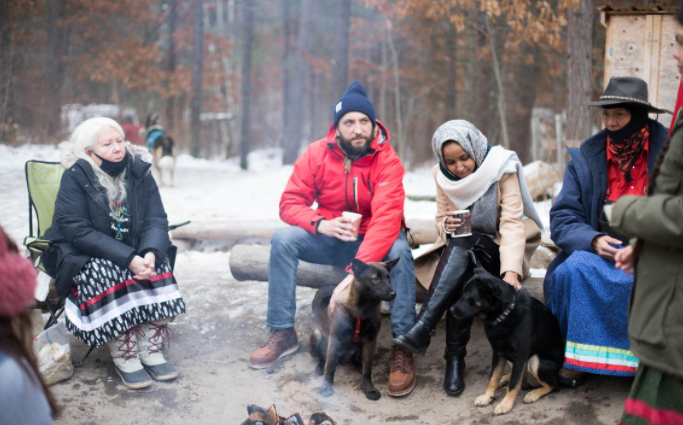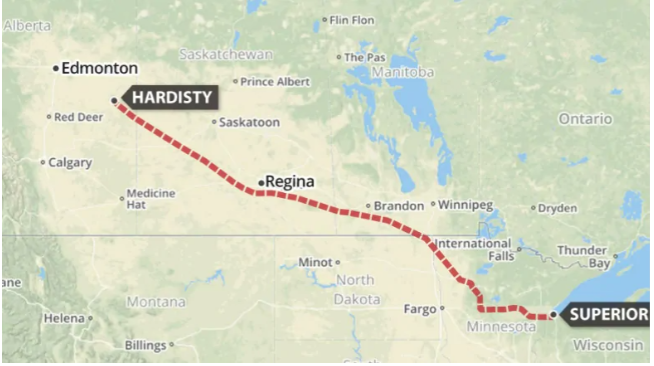Article by PBI-Canada

Photo: (left to right) Audrey Thayer, Tim Mynett, Ilhan Omar, Lorna Hanes, and Tara Houska meet at a Line 3 opposition camp. Photo by Hannah Olson/Bemidji Pioneer.
On January 30, U.S. Representative Ilhan Omar met with Indigenous land defenders and water protectors opposed to the Line 3 pipeline.
Omar, the member of Congress for Minnesota’s 5th congressional district, tweeted: “I am in Northern Minnesota meeting with indigenous leaders organizing to #StopLine3. We owe it to future generations, to the indigenous communities we’ve signed treaties with, and to every living being on this planet to stop building fossil fuel infrastructure.”
The Giniw Collective, an Indigenous-women, 2-spirit led frontline resistance movement, also posted about Omar’s visit.
“Today, Giniw Collective hosted Congresswoman Ilhan Omar, a longtime ally of Indigenous peoples. We visited the proposed crossing of Line 3 tar sands under the Mississippi River headwaters. We visited a Line 3 pipe yard. Sheriffs followed and threatened to intervene the entire trip, but Congresswoman Omar is committed to uplifting our voices and the voice of our Mother. This is what solidarity looks like.”
The Calgary-based Enbridge Inc. 760,000 barrel per day Line 3 tar sands pipeline would run from Hardisty, Alberta to Superior, Wisconsin. It would be 1,659 kilometers in length, of which about 585 kilometers would be in the United States.
Prime Minister Justin Trudeau approved the construction of the Line 3 pipeline in Canada in November 2016. Enbridge has reported that the Canadian portion of the pipeline is complete and began commercial service in December 2019.
The Rainforest Action Network has documented that the top five financiers of Enbridge are Canadian banks: TD Bank, Bank of Montreal, Scotiabank, RBC, and CIBC. Collectively they have provided billions of dollars in financing to Enbridge.
RAN has further noted: “The [542 kilometers] Minnesota stretch of the pipeline is all that remains to be built. In November 2020, the Minnesota Pollution Control Agency approved the final permits for the pipeline.”
Work on the pipeline began in Minnesota on December 1 and is expected to take 6 to 9 months to complete.
On January 12, Resist Line 3 tweeted: “The good news is, resistance to the pipeline is growing. On-the-ground action to stop construction is led by Indigenous womxn and Two-Spirit folks at @GiniwCollective, with @nfld_al3, @MN_350, and @SunriseMvmtTC all working together with them to #StopLine3.”
Resist Line 3 also highlighted: “There’s a new Indigenous-led Line 3 resistance camp on the map – Camp Miigizi! Follow them on Facebook to support Miigizi as it takes flight.”
On January 14, the Giniw Collective tweeted: “[This morning] water protectors locked to each other inside a Line 3 pipe segment, halting construction at an Enbridge worksite as dozens more held space.”
That action was preceded by another on January 9 in which water protectors and Anishinaabe jingle dress dancers walked onto a Line 3 worksite.
Eight people were arrested at that action.
Tara Houska, the founder of Giniw Collective, commented: “We saw Minnesota’s police officers protecting a Canadian tar sands pipeline.”
PBI-USA, which supports the accompaniment of Indigenous land defenders and environmental human rights defenders in Latin America, is following this situation with great concern.

